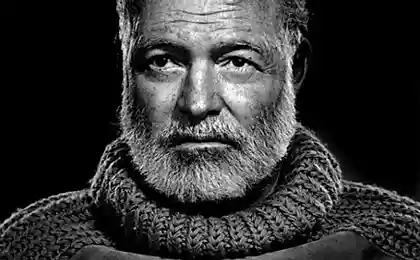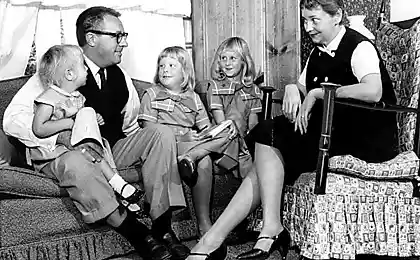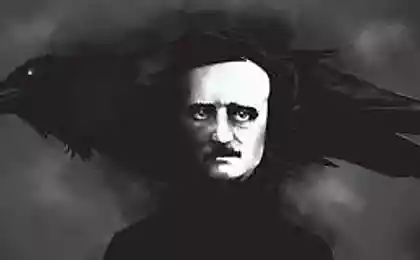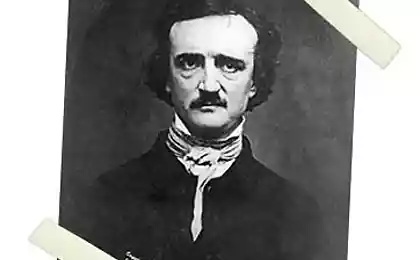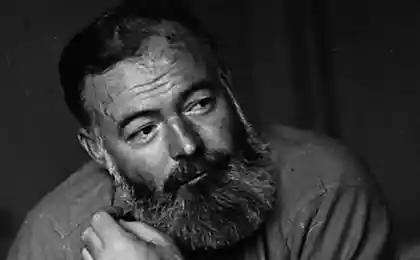789
Hemingway, Bradbury and Paustovsky how to write
Stephen King - about where to put the desk, Ernest Hemingway - about the importance of the built-in detector schlock, Paustovsky - about the futility of a notebook. h3> «Theory and Practice" have collected a selection of informal guides for those who write. < br />
Stephen King h3> Stephen King proclaimed the most successful writers of modern, boasts an impressive number of bestsellers. "On Writing" - it's kind of a program part memoir, part meditation on the life of the writer. This work King decided after he was hit by a car. As often happens after such shocks, he revised his attitude to life and to his own craft. In response to skeptics who do not perceive the popular writer as a teacher of good style, the famous journalist Roger Ebert said: "Having found the book a lot of useful and quips about the craft, I forgot about any snobbery».
- «Description begins in the writers' imaginations, and ends - in the reader».
- «All that I ask you - is try to write better and remember to write adverbs - human weakness write "he said" or "she said" - the perfection of the gods ».
- « It begins with the following: put a table in the corner, and every time takes to write, remind yourself why it is not in the middle room. Life - is not supported for the arts. Quite the opposite ».
- « Let's face? If you do not have time to read, there is no time (and skill) for writing. It's simple ».
Ray Bradbury h3> In the book "Zen in the art of writing" Ray Bradbury shares not only his experience as a writer, but also infects his admiration profession. The "Zen ..." practical advice on the formation of style and work with publishing houses are interspersed with excerpts from his own biography of Bradbury. This book - a manual and manifesto, impregnated with wisdom and enthusiasm.
- «The secret of creativity is to treat their ideas as to the cats - just get them to follow you».
- «Read the books that sharpen your perception of color, shape and global scale ».
- « We need art in order not to die of Truth ».
- « Our culture is saturated with time as a treasure and trash ». < /
Anne Lamotte h3> Anne Lamotte is better known as the author of books nonfikshn, but its benefit Creative Writing "Bird the bird" demonstrates that it is also an outstanding modern philosopher. This book, 1994 - at the same time practical instruction that introduces the basics of the profession, and words of wisdom from which you can extract the thought of how important it is to overcome self-doubt and to establish a balance between intuition and calculation.
- «You start to weave words like beads, in order to tell the story. You eaten a desire to communicate, teach or entertain, you want to capture the moments of happiness, to bring to life the imaginary events. But you do not want all this really happened ».
- « Reading and writing reduce loneliness. They deepen and strengthen our sense of life, nourish the soul. When writers make us nod on the accuracy of their observations, to laugh at yourself or at all around us there are new forces. We are given a chance to dance with the absurdity of life, rather than suffer from it again and again. It's like singing on a boat during a strong storm. You can not withstand the elements, but singing can change the mood of those on board the ship ».
Steven Pressfield h3> The writer and screenwriter Steven Pressfield works by trial and error. In his book "The War of creativity", he concentrated on the main obstacles facing any creative person, among them - the fear, self-doubt and just plain laziness. Pressfield talks about his system to combat various forms of resistance. Speaking of the Resistance, he wrote with a capital letter.
- «You are paralyzed by fear? This is a good sign. Fear - it's good, it's the same light as a lack of confidence. Fear shows us what to do. Remember the cardinal rule: the more we are afraid of work, the need to be confident that just have to do it. The resistance is experienced as fear - fear level is equal to the degree of resistance. Therefore, if we are afraid to do something, it means that this idea - is very important for us, and that it contributes to the development of talent ».
« Board of writers » h3> The collection of quotations anecdotes and truths from the "literary luminaries" was first published in 1999. It has a lot of useful information on various topics - from the search for a literary agent to the study of strong characters. The book covers all aspects of the work of the writer - grammar, genres, money, plot, plagiarism, and, of course, the inspiration.
- Ralph Waldo Emerson: "Finish the evening one episode and the next day - get to work again, but in a good night's sleep is required to break. Here you can not restrain himself ».
- Charles Bukowski:" Do not write a story as long as it will not bring you the same pain as the red-hot .... ».
- F. Scott Fitzgerald: "Start with a particular person and you will find that create a typical image. Start with the typical image and realize that you have not created anything ».
- Saul Bellow:" Never change the text if you wrote it, waking up in the middle of the night ».
- TS Eliot: "Young poets imitate, mature - steal».
- Kurt Vonnegut: "Find a topic that you are concerned and that, in your opinion, should find an echo in the hearts of others. It is this, rather than the language of the game, the object of this concern, which will be the most exciting and attractive element in your style ».
- Mark Twain:" Write for free, as long as someone does not offer you money; If, within three years it does not, then your mission - to cut the trees ».
Stanley Fish "How to write an offer» h3> The literary theorist Stanley Fish is not just written instructions for writers and seriously explored language as a cultural phenomenon. Fish wisely refutes the postulate that the proposal should be brief. As a counter-argument, he cites the best phrase of Shakespeare, Dickens and Lewis Carroll. After a literary examination, he confidently declares eloquence pledge beauty of literature. Fish analyzes of phrase as an example offers from "outside Enderby" Anthony Berdzhissa:
- «The words slip into a cell, certain syntax, and they sparkled like the air motes various impurities, which we call meaning. Before the words come to their cells, it's just individual units aimed everywhere and nowhere. But as soon as word gets in place, "Definitions" for him, it demonstrates the remorseless logic of syntactic structure - the words are associated relationships. They are subject or object of action, and they are combined into a kind of judgment on the world, which may be his praise, deny or ennoble ».
Larry Phillips' Ernest Hemingway on Writing» h3> When life Hemingway insisted that talk about writing - a waste of time. Nevertheless, he often reflected on this theme in his stories, letters, interviews, and even special articles. Larry Phillips wins the most profound and witty statements about the identity of the writer Hemingway and important components of the craft. In a thin brochure talked about how to discipline themselves, how to remove the excess material - and all this from the mouth of Hemingway.
- «All good books are alike in that they are plausible reality, and when you finish reading, is the feeling that everything described happened to you, and then - it belongs to you: good and evil, delight, repentance, grief, people, places, and even the weather. If you can give it all to people - then you're a writer ».
- « There is no symbolism. The sea - a sea. The old man - a man. The boy - a boy, and the fish - fish. Sharks are all equal, there is no better or worse than a shark. All the symbolism of which people talk - it ... dog. What is happening on the other side - that is what you see when you have some knowledge ».
- « All my life I looked at the words as if he saw them for the first time ».
- "First, we need talent, great talent. Such as in Kipling. Then self-discipline. Self-discipline Flaubert. Then you need a clear idea of what the prose can be, and need to have a conscience, this is absolutely immutable, as the standard-meter in Paris, in order to guard against counterfeiting. Then the writer requires intelligence and unselfishness, and most importantly - the ability to survive. Try to find it all in one person, despite the fact that the person is able to overcome all those influences that weigh upon the writer. The most difficult thing for him - because so little time - it is to survive and to bring the work up to the end ».
- « The greatest gift a good writer - a built-in detector stressoustojchivyj schlock. This writer's radar, and it is all good writers ».
Mortimer Adler, Charles Van Doren "How to Read» h3> These books are called "living classics" - "classic" because it reflects the fundamental idea of the power of the printed word, and "live" because it divides the concept of the power of words, and his perception of the environment, leaving room for interpretation. From baseline to read a quick swipe, from analysis to speed reading - Adler useful tips on reading as a scientific papers and literature. The most interesting part of the book is devoted to the yin-yanyu - plexus acts of reading and writing. Adler points out how important it is to record your thoughts in the margins:
- «Buying the book you are doing it with their property - such as buying clothes or furniture. But in the case of books the act of shopping - a prelude to possess. Completely it will come only when you make a part of the book itself, and the best way to make himself part of the book - to do this in her remarks ».
- « Why mark in the fields required to read? Firstly, it wakes you up - in the broadest sense. Secondly, active reading - this thinking, and thinking is usually expressed in words, spoken or written. If a person says that he is mentally understands something, but can not explain it with words, it means that he does not understand his thoughts. Third, write about their own experiences to help you remember the author's thoughts ».
- « Reading should be a conversation between you and the author. He probably knows more than you about the subject - otherwise you would not be interested in his book. But understanding - a two-way process. The student must ask questions of themselves and the teacher, not yet understand what is at stake. Remarks on the fields - is the literary expression of your disagreement or solidarity with the author. This is the greatest tribute you can it bring ».
Paustovsky" Golden Rose » h3> Paustovsky a lot of time to analyze the creative process, but is seen by many only as the author of school stories about nature. All his thoughts about the writer's skill, he has collected in his book "The Golden Rose" - perhaps the most lyrical manual for writers. Paustovsky says that a writer should distinguish colors better than the artist that characters always start to resist the plan - and you need to listen to them, but to go everywhere with a notebook optional. All these instructions are supported by metaphors, his personal example the statements of other writers and novels. So, in the book there is a separate story that properly spaced points can save the product. But the main thing in the "Golden Rose" - not an abundance of useful tips, and sincere enthusiasm with which Paustovsky writes about the Russian language, which he infects anyone who picked up this book.
- «The idea, as well as lightning occurs in the human mind, saturated thoughts, feelings, memories and notes. Accumulating all this gradually, slowly, until it comes to the extent of voltage, which requires an imminent discharge. Then the whole compressed and several chaotic world produces lightning - plan ».
- « One should never think that this one bush rowan or is this gray drummer in the orchestra need me someday for a story and because I have especially closely, even somewhat artificially, they observed. Watch, so to speak, "on duty", from a purely business reasons. It should never be forced to cram into prose albeit very successful observation. When necessary, they will be included in it and will be in place ».
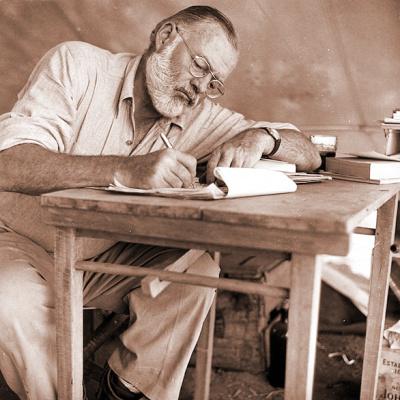
Ernest Hemingway at work. em>
Also read: h3> The most useful books on advertising
Interesting facts about the productivity, time and happiness
Quotes of the great advertisers
via theoryandpractice.ru/posts/5199-proizvodstvo-smyslov-kheminguey-bredberi-i-paustovskiy-o-tom-kak-pisat-knigi
- «The words slip into a cell, certain syntax, and they sparkled like the air motes various impurities, which we call meaning. Before the words come to their cells, it's just individual units aimed everywhere and nowhere. But as soon as word gets in place, "Definitions" for him, it demonstrates the remorseless logic of syntactic structure - the words are associated relationships. They are subject or object of action, and they are combined into a kind of judgment on the world, which may be his praise, deny or ennoble ».
- «You are paralyzed by fear? This is a good sign. Fear - it's good, it's the same light as a lack of confidence. Fear shows us what to do. Remember the cardinal rule: the more we are afraid of work, the need to be confident that just have to do it. The resistance is experienced as fear - fear level is equal to the degree of resistance. Therefore, if we are afraid to do something, it means that this idea - is very important for us, and that it contributes to the development of talent ».

